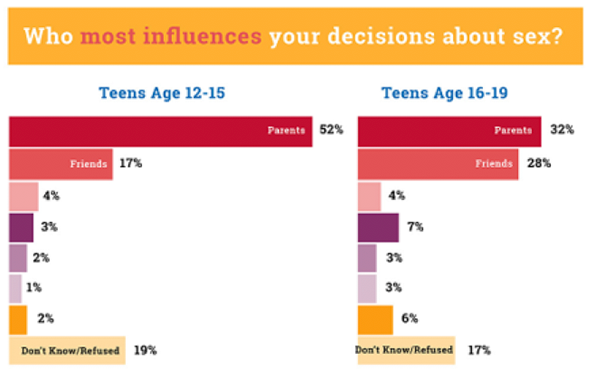Teen Pregnancy Prevention
The parent-child relationship is key to avoiding accidental pregnancies in your teens. It's important to talk to your kids early about sex, and repeat that talk several times as they grow up. For more information about talking to your child about sex read below. For more information about the Adolescent Pregnancy Prevention program at South Central Public Health District, or if you would like help getting the "Reducing the Risk" curriculum into your school, please contact:
Adria Masoner
Health Education Specialist
Phone: (208) 678-8221 *2303
Email
Help from Idaho's Adolescent Pregnancy Program:

Building healthy relationships
Parents have the largest influence on their adolescent’s decisions about their sexual health, even ranking above friends! Research shows teens who have a good relationship and open communication with their parents wait longer to have sex. When they are ready, they are more likely to use contraception. In fact, 6 in 10 teens wish they could talk openly about sex with their parents. Because teens want their parent’s advice, it is important to be approachable so they feel comfortable coming to you with sexual health concerns and questions and will include you in making choices that are safe, reflect their values, and support their future goals and plans.
The importance of a father's involvement
Research shows that teens with active fathers make better sexual health decisions. A study conducted by the Power to Decide (formally known as The National Campaign) shows the majority of young women seek the advice of their fathers over their mothers about romantic relationships and sex. The study showed that fathers did not view themselves as influential regarding their daughter’s decisions about relationships and sex. However, the research showed that young people are looking to their parents (not just mom) for advice on relationships and sex.
It is imperative that fathers be open and prepared to talk to their son or daughter about sex, love, and relationships. Click here to learn more about how dads matter!
Tips to have “THE TALK”
1: Timing – Early and Often
Start the conversation early! Parents or caregivers can start the conversation using age-appropriate language to discuss relationships and intimacy. “The Talk” is not a one-time conversation. Parents may dread the “Where do babies come from?” question posed by their 5-year-old, however this can start the conversation that will be continued throughout their adolescent development.
2: Values and Attitudes – What is Sex?
Be clear about your own values and attitudes about sex, love, and relationships. It may not seem like it but teens want to know your values and attitudes about these subjects. Before you talk to your teen, consider your attitudes regarding teen dating, being sexually active, abstaining from sex, and contraception. When promoting abstinence, be sure to clearly define what sexual activity you want your adolescent to abstain from. It is important to be specific when you talk to your teen about your values and attitudes regarding sexual activity.
3: Listen – Be Open to Questions!
Just because your adolescent has questions about sex, does not mean they are engaging in it. Many teens say they are afraid their parents will “freak out” if they have questions about sex. Listen to their questions without assuming potential motives behind the question. Teens are exposed to sexual content in movies, music, social media, and magazines. This exposure raises a lot of questions that you can help answer. Keeping your answers short, simple, and factual can help address any uncomfortable feelings on either side.
4: Accurate and Mature Language – Keep it Real!
Use accurate and mature language when discussing sex with your teen. This can help establish the trust in your knowledge as a good source of information. Using slang terminology can cause embarrassment on both sides. If you don’t understand the terminology your teen is using, let them know! Asking what their slang means can help establish rapport and build trust as they see you actively engaging with them to understand their perspective.
5: Look It Up – Not Having all the Answers
It’s okay if you don’t know all the answers to your teen’s questions. Be honest with them if you don’t know the answer. You can suggest looking up the answer together. Remember this is an ongoing conversation, so if you don’t know the answer right away, you have time to look it up!
*Tips listed are a compilation of tips from resources below*
To learn more about how to start the conversation with your teen, check out these great resources!
The mission of the Adolescent Pregnancy Prevention (APP) program is to decrease teen pregnancies and sexually transmitted diseases (STDs). The program uses evidence-based curriculum (called “Reducing the Risk”) to teach teen about sexual health and risk avoidance.
Reducing the Risk helps teens to:
- Evaluate the risks and consequences of becoming an adolescent parent or becoming infected with STDs.
- Recognize that abstinence or using contraception are the only ways to avoid pregnancy, HIV infection, and other STDs.
- Provide factual information about sexual activity that demonstrates protection is essential for avoiding teenage pregnancy and STDs.
- Teach effective communication skills for remaining abstinent and for avoiding unprotected sex.
For more information about the Reducing the Risk program and ETR Associates, visit their website.
Learn more about preventing teen pregnancy here.
Links
Idaho Department of Health and Welfare
Centers for Disease Control (CDC) – National Prevention Information Network
The Naked Truth


